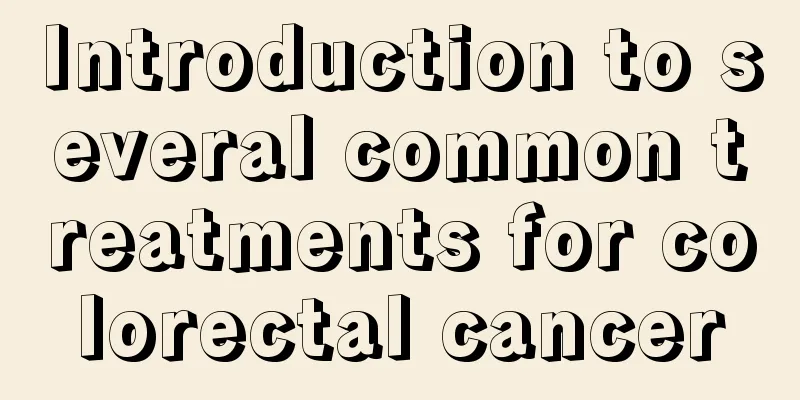What methods can be used to treat lung cancer? Summary of the most effective treatments for lung cancer

|
The disease that is most harmful to people is probably cancer, and lung cancer is one of them. Many lung cancer patients are in great pain and think that they are not far from death. In fact, this view is very wrong. Lung cancer patients still need to actively receive treatment. So what are the methods for treating lung cancer? 1. Chemotherapy Chemotherapy is the main treatment for lung cancer, and more than 90% of lung cancers require chemotherapy. The efficacy of chemotherapy for small cell lung cancer is relatively certain regardless of early or late stages, and even about 1% of early small cell lung cancers are cured by chemotherapy. Chemotherapy is also the main means of treating non-small cell lung cancer, and the tumor remission rate of chemotherapy for non-small cell lung cancer is 40% to 50%. Chemotherapy generally cannot cure non-small cell lung cancer, but can only prolong the patient's survival and improve the quality of life. Chemotherapy is divided into therapeutic chemotherapy and adjuvant chemotherapy. Chemotherapy requires the use of different chemotherapy drugs and different chemotherapy regimens according to the different histological types of lung cancer. In addition to killing tumor cells, chemotherapy also damages normal human cells, so chemotherapy needs to be carried out under the guidance of an oncologist. In recent years, the role of chemotherapy in lung cancer is no longer limited to patients with advanced lung cancer who cannot undergo surgery, but is often included in the comprehensive treatment plan for lung cancer as a systemic treatment. Chemotherapy inhibits the bone marrow hematopoietic system, mainly the decrease of white blood cells and platelets, which can be treated with human granulocyte stimulating factor and platelet stimulating factor. Chemotherapy is divided into therapeutic chemotherapy and adjuvant chemotherapy. 2. Radiotherapy Radiotherapy is more effective for small cell lung cancer, followed by squamous cell carcinoma, and the worst for adenocarcinoma. The irradiation field for lung cancer radiotherapy should include the primary lesion and the mediastinum of lymph node metastasis. At the same time, it should be supplemented with drug therapy. Squamous cell carcinoma is moderately sensitive to radiation, the lesions are mainly local invasion, and the metastasis is relatively slow, so palliative treatment is often used. Adenocarcinoma is less sensitive to radiation and is prone to blood metastasis, so simple radiotherapy is rarely used. Radiotherapy is a local treatment and often requires combined chemotherapy. The combination of radiotherapy and chemotherapy can be used in a synchronous chemoradiotherapy or alternating chemoradiotherapy method depending on the patient's condition. 3. Surgery Surgery is the first and main treatment for lung cancer, and it is also the only treatment that can cure lung cancer. The purpose of surgical treatment for lung cancer is: Completely remove the primary lesion of lung cancer and metastatic lymph nodes to achieve clinical cure; Removing the vast majority of the tumor to create favorable conditions for other treatments is called cytoreductive surgery; Reduction surgery: Suitable for a small number of patients, such as those with refractory pleural and pericardial effusions. By removing pleural and pericardial implant nodules, removing part of the pericardium and pleura, the clinical symptoms caused by pericardial and pleural effusions can be cured or alleviated, and life can be prolonged or the quality of life can be improved. Reduction surgery requires local and systemic chemotherapy at the same time. Surgical treatment often requires adjuvant chemotherapy and radiotherapy before or after surgery to improve the cure rate of surgery and the survival rate of patients. The five-year survival rate of surgical treatment of lung cancer is 30% to 44%; the mortality rate of surgical treatment is 1% to 2%. Chemotherapy, radiotherapy and surgery can all play a role in treating lung cancer. Therefore, those who have already suffered from lung cancer can begin to use the above three methods to treat their disease. This will reduce the pain they suffer and put more smiles on their faces. |
>>: What are the best treatments for lung cancer? The 4 best treatments for lung cancer
Recommend
What are the methods to treat rheumatism?
If rheumatic disease occurs in the body, it can a...
What should you pay attention to when exercising with teratoma
Ovarian teratoma is a common gynecological tumor ...
What is the cure rate of ductal breast cancer?
The patient has invasive ductal carcinoma, a type...
How to improve the cure rate of prostate cancer
After the symptoms of prostate cancer occur, effe...
Tips for curly hair
Some people are born with straight hair, and ever...
How to overcome the difficulty in diagnosing osteosarcoma
When osteosarcoma is serious, it will always affe...
Symptoms of severe anxiety disorder
Nowadays, many people suffer from severe anxiety ...
Does skin cancer affect others?
Skin cancer has obvious symptoms, and sometimes i...
What is the negative pressure for suction?
Many people may have done suctioning, but there a...
How to identify the early symptoms of cervical cancer? There are 9 ways to diagnose cervical cancer
Cervical erosion is a very common disease. Patien...
How long can a child with nasopharyngeal cancer live without treatment
According to your current description, if a child...
How does Chinese medicine treat pancreatic cancer
In recent years, pancreatic cancer has become one...
What should I do if my transaminase is high?
Transaminase is divided into two types: alanine a...
What are the treatments for pancreatic cancer
Pancreatic cancer is one of the common malignant ...
Conservative treatment for advanced colon cancer
Colon cancer is a disease that we are exposed to ...









